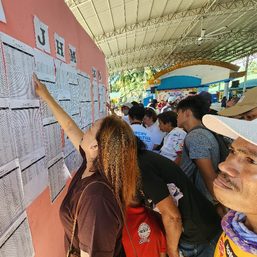SUMMARY
This is AI generated summarization, which may have errors. For context, always refer to the full article.
![[OPINION] Tough times call for ‘flexible’ governance](https://www.rappler.com/tachyon/2023/11/Tough-times-call-for-flexible-governance.jpg)
Some prisoners on drug charges got elected in the last barangay polls, reported Rappler and other news media. I can see pundits going tsk, tsk, their heads shaking.
But I’m with Interior Secretary Benjamin Abalos who said, “This shows that democracy is alive in the country and that inmates continue to enjoy human rights even while they are in jail.”
Yesss. Always look on the bright side of life. Perhaps this also shows that the inmates’ barangays have discerning voters who picked candidates with already known records.
And so what if the inmates won from inside the slammer? Our nation’s tough times call for adaptable values and flexible governance more than ever.
For example, President Marcos flexibly named a longtime pal, a fishing tycoon, as Secretary of Agriculture even though he’s a fellow college dropout. But he became a billionaire anyway, so he must be OK for the job. Bravo.
Same goes for the President’s Maharlika wealth fund CEO appointee, a corporate suit who didn’t meet the required MA or PhD in finance – until the requirement was scrapped by the very working group he was a part of. Excellent flexibility.
Folks, to rephrase Deng Xiao Ping on his proverbial cat, it doesn’t matter if the fox is red or gray as long as it can guard the henhouse.
But was it really necessary for Sec. Abalos to clarify defensively that it’s okay for the inmates to be elected because they hadn’t been convicted yet?
True, the Omnibus Election Code only disqualifies convicted prisoners with sentences of more than one year. But c’mon, let’s be flexible.
Sec. Abalos should realize that conviction actually awards inmates a formal certification of merit in their fields. Like a BA, an MA, or a PhD. That’s even better than presidential appointees who have none.
Why, with some upskilling, convicted inmate-barangay officials might later qualify for gainful careers in customs, airport security, the anti-narcotics squad or, depending on their bureaucratic smarts, for more lucrative spots in public administration. No MAs necessary.
That would be a natural fit for our Transparency International ranking as one of the top one-third most corrupt countries in the world. New local officials with convictions might even lift us to number one.
Besides, we won’t have to worry about justice being delayed in endless court proceedings should prisoner-public officials be charged with wrongdoing again like, say, whistle-blowing on superiors. No sweat, they’re already inside.
It’s really time for our leaders to always look at the glass half-full.
For example, anyone who’s in touch with the public mood would see potential for heightened civic involvement in the raucous debate that rocked the internet when Miss Philippines lost in the Miss Universe contest.
Citizens from all walks of life and genders eagerly chopped, minced, diced, fought to get a word in edgewise, debating why our Michelle Dee didn’t make it to the Top 10. Some clearly showed a keen grasp of current events, referencing Pulitzer Prize-winning journalist Ronan Farrow’s opinion that our Miss Dee “was robbed.”
Again, let’s look outside the box. Our citizens have long intuitively fused showbiz popularity with electability. This time, we should harness their fervent adoration of the body beautiful to energize the body politic.
How about asking the National Commission on Culture and the Arts to spark enthusiastic political engagement by holding pageants like Miss Impunity, Miss Pork Barrel, or Miss Political Dynasty? (I see someone already pushing for Miss Confidential Fund.)
For the Q&A portion, emcees can ask the aspirants truly meaningful questions like:
“A road in your congressional district is being repaved – again. How would you safely skim off the discretionary fund this time?”
“Would you prescribe an ‘all-government approach’ to put a critic in jail for seven years without bail and why?”
“You’re making a highly publicized court appearance for alleged graft. How would you accessorize? With a wheelchair, walker, neck brace, or an IV drip unit?”
Watch spirited debate erupt over whether the Pharmally logo is a better national costume than the Sugar Regulatory Administration’s. Or whether Miss Davao City flubbed the answer to Question #2.
Let’s not stop there in flexibly turning opiates of the masses into tools of political tutelage.
An amazing 51% of Filipinos spend precious time following celebrities and influencers. So, have Mr. Nobodydudy do mekus mekus commentary as solons cook up dirty deals in the Batasan (“Sobra na yen, insan!”).
And how about the MTRCB tracking nasty on-air rumors on the status of political alliances like they’re showbiz love teams? Watch netizens fiercely analyze the foibles of iffy SaraBong or estranged GloMar and the impact on ICC reentry and the next elections.
Lousy ideas, you say? Well, these are lousy times. And just as crisis also presents opportunity, now is the chance for our officials to step up the flexible workings of Philippine Democracy as we know it. – Rappler.com
Rene Ciria Cruz is an editor at PositivelyFilipino.com. He edited the book A Time to Rise (UP Press), and was Inquirer.net’s US Bureau Chief from 2013-2023. He has written for the San Francisco Examiner, San Francisco Chronicle, and California Lawyer Magazine.
Add a comment
How does this make you feel?
![[OPINION] Political terrain in Taguig has shifted](https://www.rappler.com/tachyon/2023/11/binay-cayetano-taguig-november-22-2023.jpg?resize=257%2C257&crop_strategy=attention)



![[Free to Disagree] Boomers, let go please](https://www.rappler.com/tachyon/2024/07/tl-boomers-let-go.jpg?resize=257%2C257&crop=286px%2C0px%2C720px%2C720px)


![[ANALYSIS] The political divorce rocking the Philippines](https://www.rappler.com/tachyon/2024/07/TL-duterte-marcos-china-US-feud-july-4-2024.png?resize=257%2C257&crop=303px%2C0px%2C720px%2C720px)

There are no comments yet. Add your comment to start the conversation.